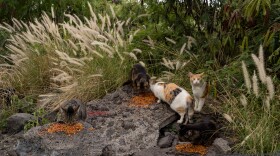Heavy rains brought flash floods across the state last week, and in the storm's aftermath, you may have seen something else — snails and slugs roaming about.
Hawaiʻi is considered the epicenter of rat lungworm disease, which is spread when people accidentally consume produce or water tainted by snails and slugs that have eaten infected rat droppings. However, certain species of snails are more likely to harbor the parasite, making researchers wonder if those species have a preference for rat feces.
HPR talked to Randi Rollins, a Ph.D. ecologist, about her work on how rat lungworm disease spreads between rodents, snails, and humans. She shared that on Oʻahu she found rat lungworm everywhere that they tested. However, she added that the amount of the parasite found in snails and slugs varied — as wet, rainy and greener areas of the island were much more suitable for the parasite.
Even though many of the snails on Oʻahu carry the parasite, Hawaiʻi Island has the highest number of human infections. Rollins said that Hilo is very wet which is why there is a higher prevalence of the disease.
"There's an idea that some folks use catchment tanks to collect water and that may be a transmission pathway to infection as well. When a snail or slug dies in water, or when it dies at all, the parasite will leave the body. And if that snail or slug is in water when it dies — the worms can leave and they can survive for some number of days in the water, so that could be a contributing factor. But it needs to be studied so that we can know for sure," she said.
Rat lungworm disease most commonly spreads when a snail ingests the parasite via rat feces and then a human ends up touching an infected snail or consuming contaminated produce that wasnʻt properly washed. Rollins emphasized not to touch snails bare-handed and to wash your produce.
"Keep in mind, we have such low reported numbers so I still buy local produce. I go to the farmer's market, I buy my produce. Just wash your veggies really well. Take care with that. But it's safe. Just want to dislodge any snails or slugs that may be on your produce," she said.
To read the research paper, click here.
This interview aired on The Conversation on Feb. 4, 2025. The Conversation airs weekdays at 11 a.m. on HPR-1.





